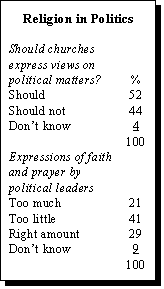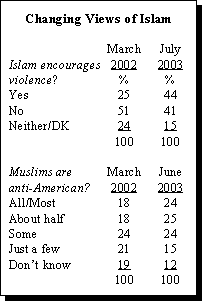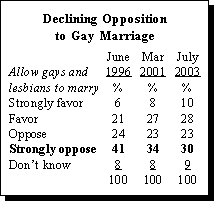Introduction and Summary

Religion is a critical factor these days in the public’s thinking about contentious policy issues and political matters. An increasing number of Americans have come to view Islam as a religion that encourages violence while a declining number say Islam has a lot in common with their own religion. The public remains divided over whether churches should stay out of politics, even as large numbers say they are comfortable with expressions of faith by political leaders. There also is evidence that next year’s presidential vote may again provoke deep religious divisions over social issues, especially homosexual marriage.
The new nationwide survey of 2,002 adults, conducted June 24-July 8 by the Pew Research Center and the Pew Forum on Religion and Public Life, shows that there has been an important shift in public perceptions of Islam. Fully 44% now believe that Islam is more likely than other religions “to encourage violence among its believers.” As recently as March 2002, just 25% expressed this view. A separate study by the Pew Research Center in June 2003 found a similar change in the number of Americans who see Muslims as anti-American: 49% believe that a significant portion of Muslims around the world hold anti-American views, up from 36% in March 2002.

In the new survey, most Americans continue to rate Muslim-Americans favorably, though the percentage is inching downward. A declining number of Americans say their own religion has a lot in common with Islam 22% now, compared with 27% in 2002 and 31% shortly after the terrorist attacks in the fall of 2001. Views of Muslims and Islam are influenced heavily by a person’s ideology and religious affiliation. White evangelical Christians and political conservatives hold more negative views of Muslims and are more likely than other Americans to say that Islam encourages violence among its followers.
As the presidential campaign takes shape, religious divisions over some controversial social issues homosexuality in particular are as wide as ever. Overall, 53% oppose allowing gays and lesbians to marry legally compared with 38% who support the idea. Opposition to gay marriage has decreased significantly since the mid-1990s, from 65% in 1996. But notably, the shift in favor of gay marriage is seen in nearly every segment of society with two significant exceptions white evangelical Protestants and African-Americans. While a higher percentage of white evangelicals (83%) than blacks (64%) oppose legalizing gay marriages, neither group has changed its views significantly since 1996.

The survey also finds conflicting sentiments about the use of religious rhetoric by politicians. The public at large is quite comfortable with President Bush’s evocation of faith and what many perceive as his reliance on religious beliefs in making policy decisions. A 62% majority thinks Bush strikes the right balance in how much he mentions his religious faith, and nearly as many (58%) believe the president’s reliance on religion in policymaking is appropriate. Yet in spite of the widespread acceptance of politicians and the president in particular referencing religion in their speeches and political decisions, many Americans express a general discomfort when exposed to actual religious statements by various politicians.
For the most part, people say religion does not frequently affect their voting decisions. Nearly six-in-ten (58%) say their religious beliefs seldom if ever affect their voting decisions, while 38% say their vote choices are at least occasionally affected by their beliefs. White evangelicals and African-American Protestants are most likely to report that their religion shapes their votes at least occasionally, while white mainline Protestants and Catholics mostly say that religion has little or no impact on their votes.
At the same time, significant numbers of Americans say they would be reluctant to vote for a presidential candidate even if generally well-qualified if the candidate was a member of a specific faith. Nearly four-in-ten (38%) say they would not vote for a well-qualified Muslim for president, and 15% express concern about voting for a well-qualified evangelical Christian. Far fewer say they would not vote for a Jewish (10%) or Catholic (8%) candidate. But fully half say they would not vote for a well-qualified atheist.
The Republican Party is more widely viewed as being friendly toward religion than the Democrats, and the margin is much wider among whites. By more than two-to-one, white respondents view the Republican Party as friendly toward religion rather than neutral (58% vs. 26%), while just 7% think the GOP is unfriendly toward religion. Whites are divided in their perceptions of the Democratic Party’s treatment of religion (41% friendly, 37% neutral, 13% unfriendly). By comparison, African-Americans are nearly twice as likely to say that the Democratic Party is friendly toward religion as say that about the Republicans (53% vs. 27%).

The survey underscores an important and often overlooked fact of American politics: African-Americans and white evangelical Christians are remarkably similar in their views about the role of religion in politics, yet they come to sharply different partisan conclusions. Both groups think the country would be better off if religion were more influential, both defend the role of religious leaders as political spokesmen, and both share similar views on important social issues, such as assisted suicide and gay marriage. Yet their attitudes toward President Bush and partisan politics are almost diametrically opposed. White evangelicals lean strongly toward Bush and the Republicans, and African-Americans lean strongly against both the president and his party. These two groups both of them highly engaged and religious stand as important countervailing forces in American public life.
The polling finds that religious beliefs play an important role in where people stand on important issues of the day, including the dispute in the Middle East. Fully 44% of Americans believe that God gave the land that is now Israel to the Jewish people while a substantial minority (36%) thinks that “the state of Israel is a fulfillment of the biblical prophesy about the second coming of Jesus.” White evangelical Protestants and, to a lesser degree, African-Americans accept both of these propositions. Significantly fewer white Catholics and mainline Protestants believe Israel was granted to the Jews by God or think that Israel represents a fulfillment of the Bible’s prophesy of a second coming.
The survey finds that there is no consensus on whether churches and other houses of worship should weigh in on social and political issues. Roughly half (52%) support the idea of churches expressing opinions on the issues of the day, while 44% are opposed. If clergy do speak out on political matters, most people think they should express their own views, even if most members of their congregations disagree with them.
President Bush’s reelection prospects have not changed dramatically in recent months, as 47% of registered voters say they would like to see Bush reelected and 37% prefer to see the Democratic candidate win. The president continues to draw strong support among white evangelicals, 69% of whom favor his reelection. Roughly half of white Catholics (52%) and white mainline Protestants (47%) also support the president’s reelection.




